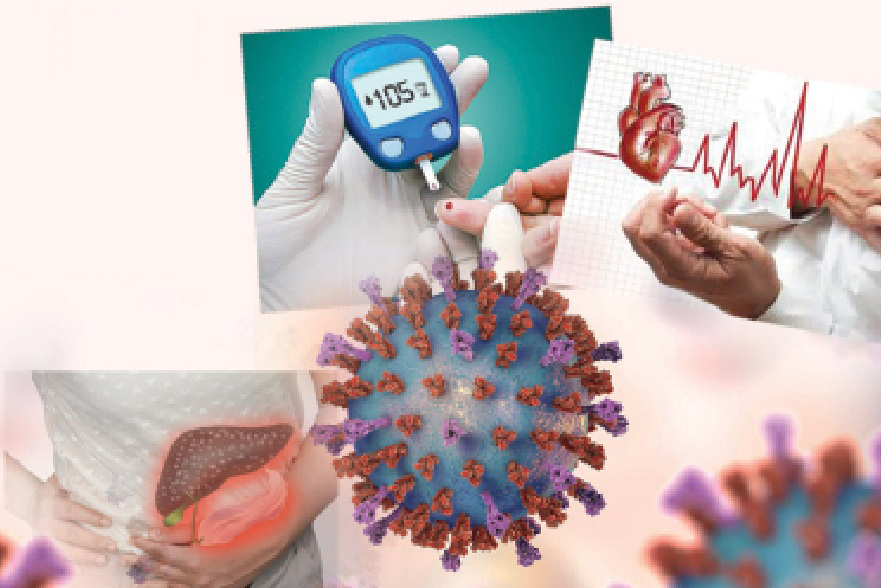Suckhoedoisong.vn - The Center for Disease Control and Prevention (CDC) has put together a list of people most at risk, vulnerable to COVID-19 due to pre-existing diseases, often called a history of illness, or background, of non-communicable disease.
People 65 years of age and older
The elderly (NCT) are more susceptible to and die from COVID-19 because: Immune function decreases with age, making older persons reduce their ability to fight against common infections.
Excessive inflammatory response: High levels of inflammation can damage the lungs and kidneys and affect many other organs in the body.
Ease of complications: Because older persons often have a pre-existing multidisciplinary condition, serious respiratory infections can complicate pre-existing heart, kidney, or liver disease.
Lung function decreases with age, so ventilation is ineffective. If more pneumonia progresses, respiratory failure is more likely to develop.

Elderly patients, people with some underlying diseases such as liver disease, cardiovascular disease, diabetes are susceptible and dangerous due to COVID -19.
Chronic lung disease
People with chronic lung disease are considered to be at high risk for COVID-19. Respiratory conditions include: Asthma, bronchiectasis, chronic obstructive pulmonary disease (COPD), pulmonary fibrosis and other interstitial lung diseases.
The risk may vary depending on the type of respiratory disease: COPD and interstitial lung disease, characterized by fibrosis and loss of lung elasticity, will impair the patient's ability to breathe if COVID-19 is present; Asthma does not cause fibrosis, but COVID-19 infection can cause a serious and potentially life-threatening attack, especially in people with poor asthma control; Bronchiectasis causes excess mucus to build up. If pneumonia develops with COVID-19, the airway obstruction can be life-threatening.
Immunocompromised people
Characteristic immunodeficiency in HIV-infected people; People undergoing cancer chemotherapy and radiation therapy; Organ transplants; People with primary immunodeficiency, often associated with genetic defects. A decrease in immunity not only increases the risk of infection, but also increases the likelihood of serious illness.
People with cardiovascular disease
The respiratory and cardiovascular systems are inherently closely linked. When a respiratory infection limits the amount of air entering the lungs, the heart has to work harder to ensure a supply of oxygen to the body's vital organs. In people with pre-existing cardiovascular disease, increasing the burden on the heart not only raises blood pressure, but also has the potential to trigger a heart attack or stroke.
People with diabetes
Type 1 and type 2 diabetes, if not well controlled, make the patient more likely to develop COVID-19 and get worse. Prolonged hyperglycemia can lead to acidosis, in which acids called ketones reduce the production of immune cells, including T lymphocytes and polymorphonuclear leukocytes. And the results may increase your chances of becoming infected with COVID-19.
People with liver disease
COVID-19 can complicate the existing liver disease in some people, increase liver enzymes, and make it worse. Certain drugs, including antibiotics, antivirals, and steroids used to treat COVID-19, are also harmful to the liver cells.
People with chronic kidney disease
Chronic kidney disease increases the risk of serious illness and death in people with COVID-19. The risk seems to increase with the severity of the disease, with dialysis people at greatest risk.
Obese people
Obesity is associated with many health disorders including: Hypertension, heart disease, type 2 diabetes, fatty liver, kidney disease increases the risk and severity of COVID-19. Additionally, obesity has been linked to impaired immunity. This is demonstrated by a high failure rate in obese people to respond to certain vaccines, including the influenza A / H1N1 vaccine and the hepatitis B vaccine.
Neurological disorders
Although not on the CDC list of risk factors, some scientists have noted that certain neurological disorders, such as multiple sclerosis, Parkinson's disease or motor neuron disorder , may increase the severity of COVID-19, by easily disturbing the swallowing reflex, impairing the coughing reflex or impairing respiratory muscles. At the same time, many drugs used to treat active neurological disorders and muscle weakness suppress the immune system, which easily facilitates more severe COVID-19 symptoms.
In a nutshell, those with underlying medical conditions, whose risk factors need to be more stringent than required social separation, wearing a mask, washing hands frequently, staying at home and managing the underlying disease well are Best Ways to Reduce Risk during the COVID-19 pandemic.
Dr. Le Thanh Hai
Suckhoedoisong.vn




